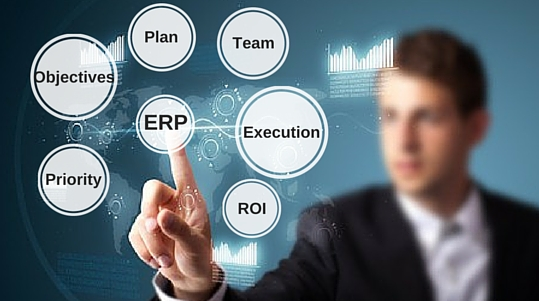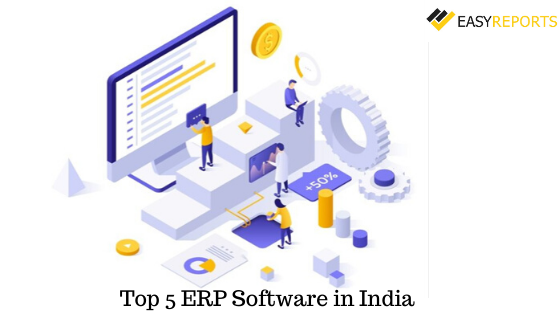December 2, 2019
ERP is a mammoth tool and has different expectations for different companies and different people. It is extensively challenging to specify which ERP is best for your business because of various factors like price, service, and many other factors. In this blog, we will explore the Top 5 ERP Software in India.
There are many ERP software companies available in the market today & continuously helping small and medium-sized businesses improve their productivity across manufacturing operations like – production & scheduling, supply chain & inventory management system, procurement, product quality & project management, warehouse management, vendor valuation, shop-floor data collection etc.

Therefore, the top 5 ERP software in India are:
- Tally
- Dynamics NAV
- Dynamics 365
- SAP HANA
- SAP B1
1. Tally
Tally.ERP 9, Tally’s premier product, is trusted by nearly 2 million businesses in more than 100 countries. Tally is one of the largest business management software providers in the world today that started way back in 1986. The product is a true all-rounder, helping businesses manage their accounting, inventory, outstanding, cash flow, banking, GST compliance and much more – with absolute ease!
The users of Tally.ERP9 are diverse ranging from Start-Ups, SMEs, Agencies to Enterprises.
Key Features of Tally.ERP9:
| Accounting | Asset Management | Audit Trail |
| Banking Integration | Barcode Integration | Bonus, Loan & Advances Management |
| Budgeting | Customer Management | Customer Support |
| Email Integration | Financial Management | HR & Payroll |
| Inventory Management | Investment | Invoice |
| Job Costing | Manufacturing | Multi-Currency |
| Multi Location | Multiple Company | Online document storage |
| Outstanding | Payroll Management | POS Invoicing |
| Quotation & Estimates | Taxation Management | Warehouse Management |
| Accounts Payable | Accounts Receivable | Bank Reconciliation |
| Fund Accounting | Cash Management | Compliance Management |
| Balance Sheet | Accounting Integration | Bills of Material |
| Billing & Invoicing | Budgeting & Forecasting | Analytics |
| Sales Management | Service Tax | Checks & Controls |
Tally.ERP 9 software is to the complete product that retains original simplicity yet offers comprehensive business functionalities such as Accounting, Finance, Inventory, Sales, Purchase, and Branch Management along with capabilities like Statutory Processes, excise and etc. Tally.ERP 9 also ensures the utmost security provisions for sensitive user-data.
Functions of Tally.ERP9:
With its highly scalable functionalities, Tally ERP 9 enables businesses to grow.
- Tally ERP 9 lets you generate data from anywhere. Moreover, you can customize the data as per your business needs.
- It can fetch data from different locations and create a consolidated report.
- Its TallyVault feature keeps your financial data safe and secure. You can generate keys and restrict the access only to yourself.
- You can easily transfer your accounting data from existing software to Tally without any glitches.
2. Dynamics NAV
Microsoft Dynamics NAV ERP software provides small and mid-sized businesses to gain complete control over your core business processes, to precise and perfect your supply chain, and provide insights to the employees that they need to perform at their best.
The users of Dynamics NAV are diverse ranging from Start-Ups, SMEs to Agencies.
Navision ERP Key Features:
| CRM | Document Management | Financial Management |
| Inventory Management | Warehouse Management | Manufacturing |
| Accounts Payable | Invoicing |
Microsoft’s business solution can replace an overworked and undersized accounting system. By offering a small and mid-sized businesses into a faster track of growth, and a better way to take care of its;
- Financial management– Helps to procure better prospects on the numbers and contain costs, control compliance, and maintain crystal-clear visibility into your assets and cash flow.
- Business intelligence and reporting– Base decisions on intelligence, not on emergencies. Helps in derieving relevant data and recommendations.
- Supply chain management– Use the supply chain to spur growth. Sharpen the production and shipment schedules, help cut inventory costs, and give the organization a room to grow.
- Sales, service, and project management– Priotize customers first. It helps to increase sales, control projects and processes, and get what organizations need to delight their customers through every step of their experience.
3. Dynamics 365
Microsoft Dynamics 365 is a cloud based tool that combines the technologies of traditional ERP and CRM solutions into a single system. Known for its ease of use and simple integration and in built predictive analytics, Dynamics 365 ensures users to have access to accurate and predictive business data as well as insights to help decipher and develop actions to move the company forward.
Benefits of Microsoft Dynamics ERP:
- Manage the entire supply chain.
- Automate repetitious and routine functions so that employees can focus on more critical tasks.
- Minimize the cost and complexity of administering salaries, benefits, recruiting, and performance management.
- Provide greater visibility into key performance factors, such as profitability and potential issues.
- Fulfill needs of the specific industry with functionality for vertical business processes.
Dynamics 365 Key Features:
| App Modules | Site Map Designer | Business Process Flow Enhancements |
| Editable Grids | Relationship Insights | Dynamics 365 App for Outlook |
| Mobility | Relevance Search | Interactive Service Hub Enhancements |
4. SAP HANA
SAP HANA is a business data platform. Which processes transactions and analytics at the same time on any data module, with built-in advanced analytics and multi-model data processing engines having in-memory, column-oriented, relational database management system. Which can be leveraged to develop next-generation applications for the intelligent enterprise. It uses real-time data processing or computing which fetches data directly from the main memory speeding up the data retrieval operations. SAP HANA enables data analysts to query large volumes of data in real time.
SAP HANA Key Features:
| Database Services | Multi-Engines | Security |
| Application Development and Deployment | Administration and IT Operations | Analytics and Data Processing |
| Data Access, Integration and Quality |
5. SAP B1
SAP Business One gives a complete and extensive result that automates business methodologies. Also, conveys an accurate and unified picture of discriminating, up-to-the moment business data inside the venture.
The users of SAP Business One are diverse ranging from Start-Ups, SMEs to Agencies.
SAP Business One Key Features:
| CRM | Document Management | HR & Payroll |
| Inventory Management | Manufacturing | Time Tracking |
| Sales Quotes | Warehouse Management | Quality Management |
| Employee Data Base | Integration capabilities | Applicant tracking |
| Bill of materials (BoM) | Business intelligence (BI) | Invoicing |
| Electronic funds transfer (EFT) | Inventory control | Supplier and Purchase Order Management |
These are the Top 5 ERP Software in India. Follow our blog articles for more.
